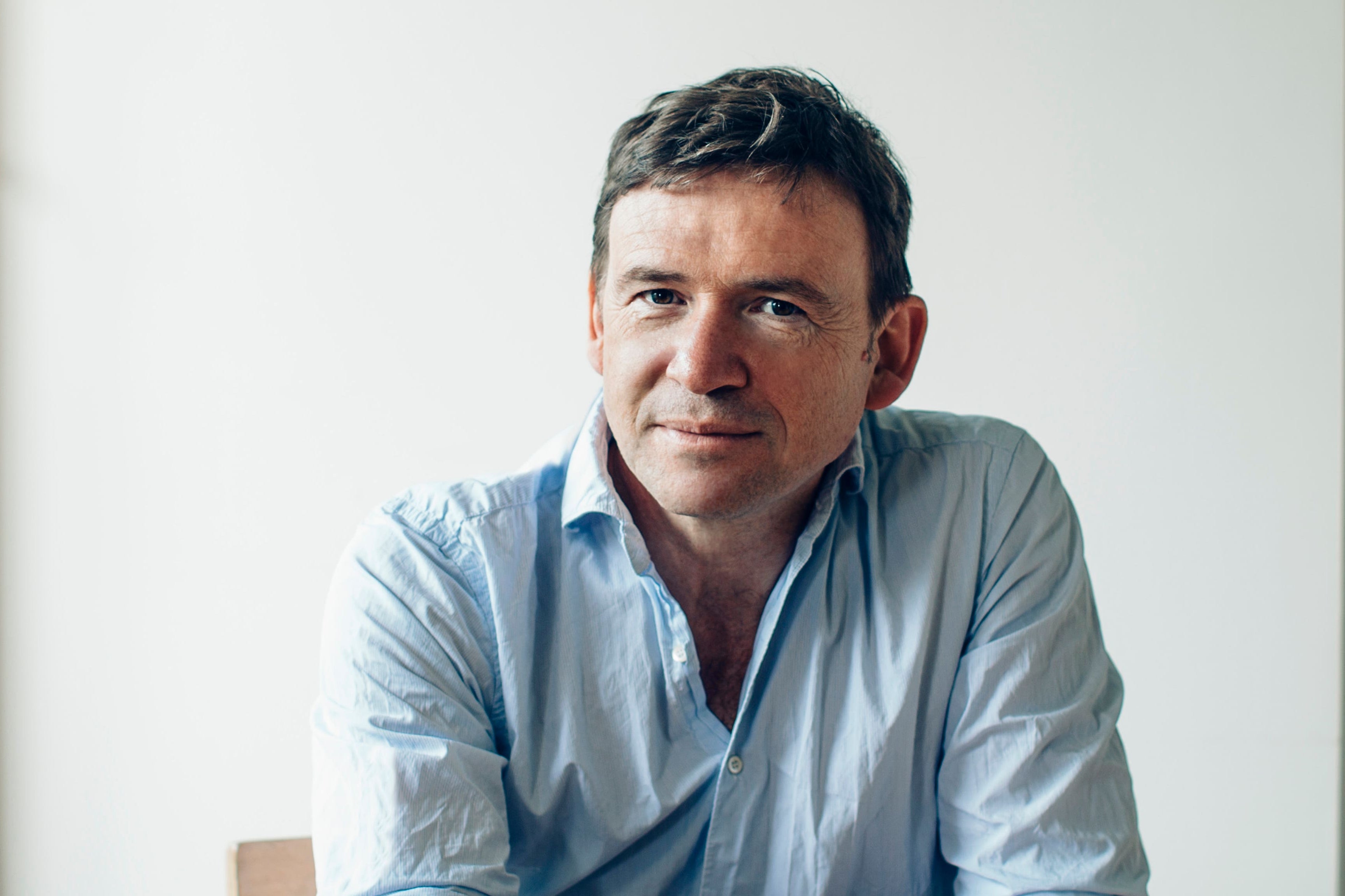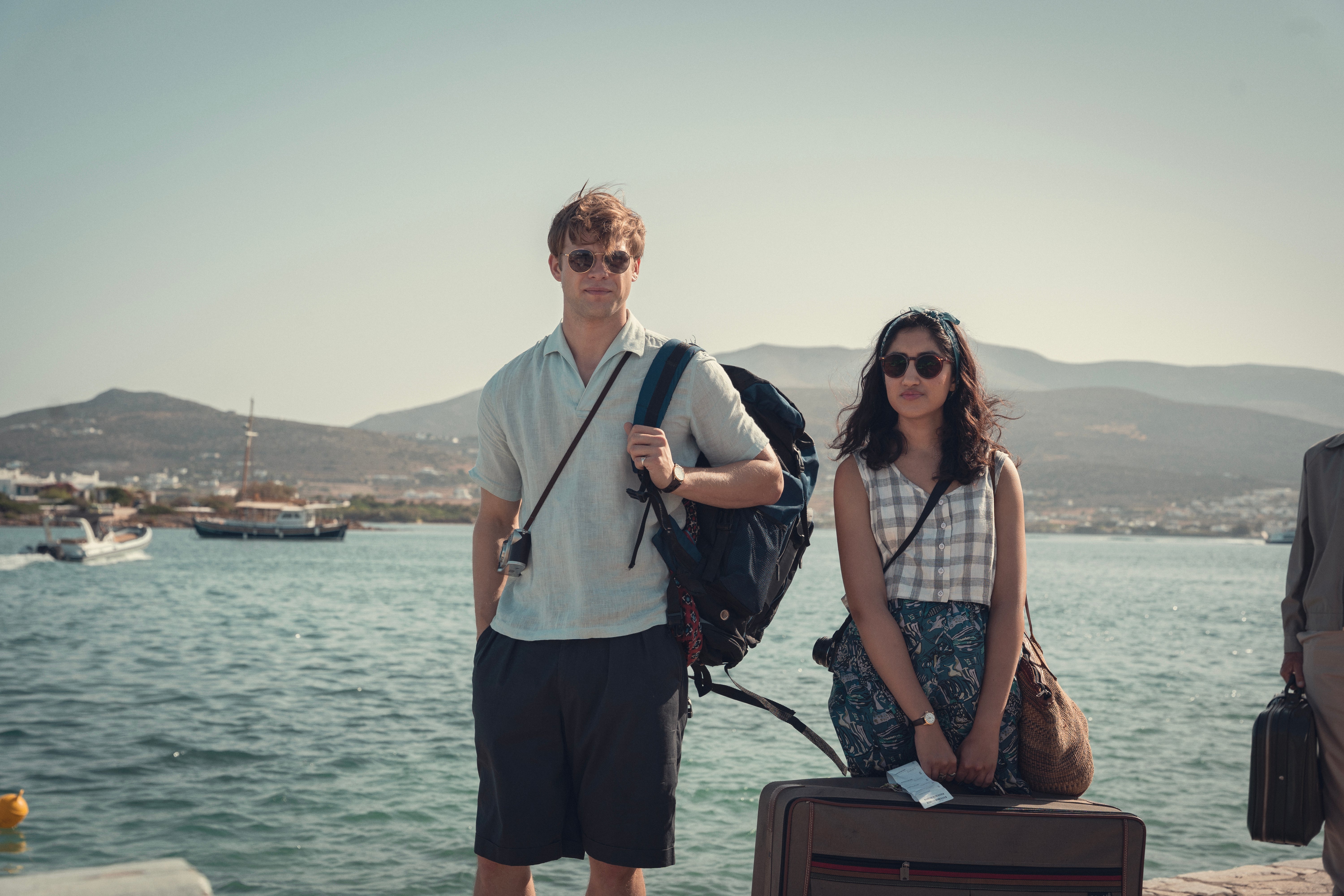David Nicholls: ‘Is there great male writing about heterosexual desire at the moment? I’m not sure’
His novels have broken our hearts, made us want to hug our dads and, now, sent us on long rainy walks through the Lake District. Bestselling author David Nicholls talks to Jessie Thompson about love, parenthood, publishing – and that infamous ending


Watch out, people. David Nicholls has been thinking about his next novel. “I’ve been trying to draw up a list in my mind of really great literary love stories that I might reread for inspiration,” he tells me. This is the man who broke the nation’s heart with One Day and whose latest novel, You Are Here, is making us all want to go on rainy hikes in search of our soulmate. Now he appears to be restocking his arsenal. Except… it’s reminded him that the great love stories don’t tend to be about love at all. “Often what seem to be love stories are really about class or family or education,” he says, turning it over in his mind.
It’s true of his own work, too. His Booker-longlisted Us (2014) was meant to be the story of a relationship, but it ended up being about fathers and sons. Sweet Sorrow, his 2019 novel about a teenage drama group’s production of Romeo and Juliet, is as much a coming-of-age story as one of first love. One Day, in hindsight, seems to him to be a book about friendship. “The things I’m drawn to tend to be about not just falling in love, but fears of the future, and hopes for the future and how we navigate our lives,” he says.
We’re speaking in the gardens of the Barbican, on what turns out to be the last sunny day of the summer. Nicholls, 57, dressed in a navy shirt and trousers, has arrived on his bike; he’s feeling a little frazzled from a hectic year that has included an epic (and ongoing) book tour for You Are Here, a mega-hit Netflix adaptation of One Day, and a new musical version of his 2003 debut novel Starter for Ten. “I’m not doing a lot of writing,” he says with a guilty smile. The writer, who grew up in Eastleigh and now lives in London, plans to turn his attention to new ideas in the autumn, but it’ll require a shift in rhythm. “I’m daunted, but I just need a little thinking time.”
You Are Here is Nicholls’s most moving novel so far, the bittersweet story of Michael and Marnie, two strangers in their early forties and late thirties respectively who have become stoical about their loneliness. A well-meaning mutual friend, concerned that their respective divorces have made them reclusive, orchestrates a long group walk through the Lake District. British readers, it turns out, are desperate to discuss walking and rambling at book events. “It’s this kind of rite of passage that people have been through – they love talking about a miserable day on the Pennines or their favourite bit of the moors,” he tells me. Regarding the book as another love story that’s not necessarily a love story, he’s been surprised at the reception. “In my head, it was quite a melancholy, bittersweet, low-key book, but people seem to have really responded to the comedy and the optimism of it.”
Self-effacing and gentle in conversation, he does not behave like a flashy bestselling author, or the storyteller of one of Netflix’s biggest hits. The 14-part adaptation of One Day made audiences gasp all over again, with even Kim Kardashian recommending it to those “in need of a good cry”. But there was an anxiety, he admits, that a new adaptation would seem like a “nostalgia fest”, only appealing to viewers aged 35 and above; ideas to have it end in 2020 were considered, then scrapped (technology would have changed the story). “The way it’s been embraced by a younger viewership and then a readership has been brilliant and surprising, and particularly surprising for my kids – because they’ve never really been able to explain what I do, and now they have something to say,” he says. (Nicholls has two teenage children with his partner Hannah.)
Audiences at his recent book events have often included “people brought along by their parents, because it’s the guy who wrote One Day”. He senses, with amusement, “a slight awkwardness of – ‘are we allowed to ask questions about One Day? Is he going to storm out?’”
In fact, Nicholls feels “a certain distance” from his biggest hit: aside from a few chapters for an episode he wrote, he’s not reread it for 15 years. The 2009 book sold over 6 million copies and was made into a (less successful) Hollywood film starring Anne Hathaway in 2011, but the immediate aftermath of such fame did bring “a self-consciousness and anxiety”. “There’s a questioning of what kind of writer you are, what’s the best move creatively versus what’s the best move from a business point of view, and should you even be thinking in the way,” Nicholls explains.

He’s at pains to point out how lucky a writer is if any book of theirs takes off in such a way, even if it overshadows later work. “I think Sally Rooney is an amazing writer and I’m sure she’ll write books that are better than Normal People, but she might never write a book that sells more than Normal People. And that’s OK,” he says. “I’m accepting now that nothing I write will ever top it, at least in terms of sales, even though I’d like to think I’m a better – not better – but more experienced writer.”
Nicholls is not rose-tinted about his past work. On debut Starter for Ten: “I’m not embarrassed by it, but I’m aware of things that I did in the book that I wouldn’t do now”. On his second, The Understudy: “It’s the one I like the least.” You Are Here certainly feels like Nicholls writing at his most wise and lyrical. It is dryly witty, but also full of acute observations on loneliness: Marnie is so isolated that she self-consciously practises conversations in her head before leaving the house, while Michael’s only connection with his ex-wife is their shared streaming account.
Michael’s marriage has ended in part because of his struggles with infertility, and he spends some of the walk wondering what it would have been like to be a father. “It did strike me that there’s no male or non-gendered word for broodiness. And yet, for a lot of men that I know, it’s an overwhelming, immense desire to be a parent, and it isn’t often as explored – what happens when that doesn’t work out,” says Nicholls. “It isn’t so much in the culture, is it? In fact, if anything, certainly when I was younger, potential parenthood traditionally, in a kind of sitcom way, sends men into a panic. Like it’s the worst thing that can happen to you – ‘Oh God, I’m gonna be a dad.’ For a lot of men I know, that’s absolutely not the case. They long for it to happen.”
For a lot of men that I know, it’s an overwhelming, immense desire to be a parent, and it isn’t often as explored
These unsung male narratives have given Nicholls a more vocal male readership in recent years. Just this morning, he received a message from a male reader of You Are Here, “a man in his forties who was alone and wanting very much to be a father and no longer certain that would happen”. After One Day, his readership felt “95 per cent female” but recent books have made that ratio “at least 70:30”.
We seem bereft of young male novelists writing about relationships and sex, though – does he think the next David Nicholls, or his precursor, Nick Hornby, is on the way? “I wonder about that,” he says thoughtfully. “When I first read Nick, and Jonathan Coe slightly before that, I did think, ‘Oh, this is new... They’re writing really accessible, funny fiction that feels accurate in its depiction of how men feel about love, and doesn’t necessarily conform to those stereotypes.’” He mentions Nero Book Award winner Michael McGee’s debut novel Close to Home, and Irish writers Paul Murray and Donal Ryan, but does see a void. “I’m not really doing my bit in terms of sex writing. I’m getting better, but I’m aware I’ve been a bit coy in the past. Thinking about One Day, I’m aware of how much I dodged that. But is there great male writing about heterosexual desire at the moment? I don’t know if there is. But there’s a lot of brilliant writing about gay relationships and certainly a lot of women writing brilliantly about relationships and love.”
Either way, there aren’t many authors as reliably able to make us cry as Nicholls. Not just through One Day’s ending, either – revisiting Us through the BBC’s 2020 adaptation made me so teary that I had to leave the room. I’ve always been intrigued as to whether Nicholls gets upset himself when he writes these scenes. “The second half of Us, which I wrote after my father died” – the novel contains a scene in which a son finds his father after he’s had a heart attack – “was quite… not tough. I mean, it was a pleasure to write that book, but it was… I did get emotional about it, yeah. And there were scenes towards the end of Sweet Sorrow,” he admits. “It’s not the sort of operatic tragic moments, it’s more likely to be in missteps and miscommunications and regrets, rather than big, flamboyant twists of fates. So I do a little bit, but I try not to – there’s a danger of becoming self-indulgent, like playing the piano with your foot on the echo pedal. It’s moving for you, but no one else.”
Although he’s modest about his success, his insights into life’s quiet disappointments feel earned. “My twenties were just overwhelmed by worry and uncertainty and anxiety about what I was doing in my life, and worry about money,” he says. He was working as an actor, but much of the decade is “vague in my mind”, with temporary jobs covering his bills. One afternoon he was on Oxford Street when a phone call brought a turning point: he had been offered a “proper, salaried, secure full-time job” as a BBC script reader, and a bit-part acting contract at the Royal Shakespeare Company. He chose the BBC job and was “instantly happier, I mean straight away, just felt like a weight had been lifted from my shoulders”.
His first big job was writing on ITV comedy drama Cold Feet; he would later adapt Tess of the D’Urbervilles, Great Expectations, and win a Bafta for his version of Edward St Aubyn’s Patrick Melrose novels. But his thirties were a formative time: he met his partner Hannah at 31, published his first novel at 35, and became a father at 39.

Six novels later, he’s adapted most of his own books – a picturesque You Are Here series feels inevitable – so I’m curious as to whether editors or producers have ever encouraged him to change them; Nicholls has said in the past he struggles with happy endings. “Oh yeah, on Starter for Ten [made into a film starring James McAvoy in 2006], we had all kinds of arguments about the ending. The ending of the novel, I don’t think is very good, it’s me trying not to write a corny romcom ending, and the film is the exact opposite, it’s far too corny a romcom ending. We struggled with that,” he says. You Are Here had about five different endings – although none, he assures me, where Michael or Marnie were unexpectedly hit by a vehicle.
But what about that One Day ending – can he ever write one so dark and dramatic again, or has he cashed that chip? “Yeah, I think so. I don’t think I could ever write another book that’s sad in that way,” he says, quite firm. Readers, perhaps we’re safe after all.
David Nicholls will be in conversation at Henley Literary Festival, in partnership with The Independent, on 2 October; henleyliteraryfestival.co.uk. ‘You Are Here’ is out now, published by Sceptre
Join our commenting forum
Join thought-provoking conversations, follow other Independent readers and see their replies
Comments